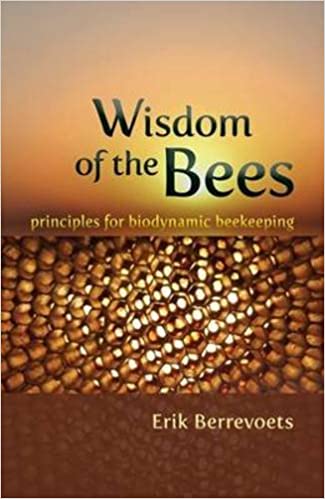Wisdom of the Bees
Principles for biodynamic beekeeping by Erik Berrevoets
From the chapter “Introduction”:
“My personal involvement in beekeeping arose very much in response to the sad state of the honeybee around the world. Despite my long-term fascination with honeybees, conventional beekeeping practicesdepicted in mainstream beekeeping literature suggest that the only way to manage bees is to dress in a fashion, to the uninitiated, looks as if one were cleaning up a toxic waste site or disarming a nuclear power facility. Such a dress code, along with the use of industrial-type blowers to remove bees to facilitate taking the honey and utilizing carbon monoxide to anesthetize queen bees to facilitate artificial insemination, prevented me from getting involved. However, my fascination continued, and I decided to keep bees and explore alternative management practices.
One of my first observations – that the bees were perfectly happy to let me observe them up close, while any attempt to open the hive and manipulate the frames was met with aggression – led me to conclude that the bees much prefer to be left undisturbed.
A search for alternative beekeeping practices among biodynamic and organic literature led to some very worthwhile books by beekeepers such as Ross Conrad (2007), Gunther Hauk (2008) and Michael Weiler (2006). Their books contain a wealth of information on the necessity of adopting a more ethical attitude for dealing with bees – natural approaches to addressing the effects of pests and diseases, sympathetic approaches to reducing our reliance on chemicals, and a need to avoid practices generally associated with agribusiness. This literature, unfortunately, contains little on managing bees without regularly manipulating the hives.
One publication stood out, however. It contains a series of lectures by Rudolf Steiner on the nature of bees, given in 1923. The lectures did not prove to be an easy read, even for one with an understanding of biodynamic agricultural principles. However, after several readings, the book revealed an entirely different way of viewing bees and nature. At first glance, the lectures do not seem to offer much practical information of immediate use. Steiner’s better known agricultural lectures of 1924 on biodynamic methods have a more practical focus. Nevertheless, the lectures on bees contain a deep spiritual understanding of the wisdom that underpins all of nature. They are a treasure trove of information on the nature of bees, the impact of economics and politics on beekeeping. the importance of honey for people, and the importance of bees for plants, all which can be used as a basis for developing alternative beekeeping practices.”
Berrevoets, Erik: Wisdom of the Bees, principles for biodynamic beekeeping
ordering in the EU: info@bdimkers.nl



